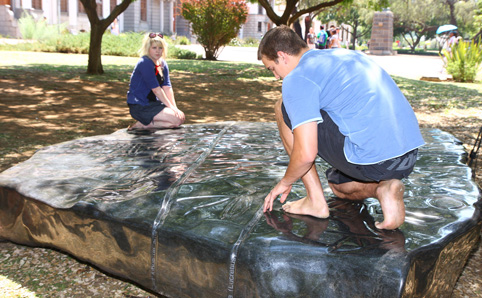Latest News Archive
Please select Category, Year, and then Month to display items
12 October 2020
|
Story Arina Engelbrecht
|
Photo Supplied
 Arina Engelbrecht from Organisational Development and Employee Well-being believes physical activity has a number of benefits for one’s health, including stress relief.
Arina Engelbrecht from Organisational Development and Employee Well-being believes physical activity has a number of benefits for one’s health, including stress relief.
Being physically active plays a big role in preventing the development of mental-health problems and in improving the quality of life of people experiencing mental-health problems.
Treatment for depression
Physical activity can be an alternative treatment for depression. It can be used as a stand-alone treatment or in combination with medication and/or psychological therapy. It promotes all kinds of changes in the brain, including neural growth, reduced inflammation, and new activity patterns are formed that promote feelings of calm and well-being. It releases endorphins – powerful chemicals in the brain that energise your spirit and make you feel good.
Physical activity can be very effective in relieving stress. Research in adults has found that physically active individuals tend to have lower stress levels compared to individuals who are less active. It also leads to improved sleep. When a person sleeps better and feels more rested, overall quality of life improves. They cope better with daily life stressors.
Reduce Alzheimer's risk
Regular physical activity can reduce your risk of developing Alzheimer's disease by up to 50%. It can also slow down further deterioration in those who have already started to develop cognitive problems. It stimulates the brain’s ability to maintain old connections as well as to make new ones.
A study asked people to rate their mood immediately after periods of physical activity (e.g. going for a walk/run, cycling, doing housework) and periods of inactivity (e.g. reading a book or watching television). Researchers found that participants felt more content, more awake, and calmer after being physically active compared to after periods of inactivity.
In conclusion, people who are physically active feel a sense of well-being, feel more energetic throughout the day, sleep better at night, have sharper memories, and feel more relaxed and positive about themselves and their lives.
“Being physically active not only changes your body, it changes your mind,
attitude, and your mood.” – Arina Engelbrecht
Willem Boshoff’s artwork placed on Bloemfontein Campus
2011-10-21
 |
Students viewing the new artwork on our Bloemfontein Campus
Photo: Hannes Pieterse |
There was great excitement last week when Willem Boshoff’s Thinking Stone sculpture arrived and was installed near our Main Building. The black granite stone, which was quarried at Boschpoort Granite in Belfast, Mpumalanga, weighs approximately 20 tons and took about a year to polish to give it its burnished quality.
On the surface of the stone are engravings that resemble the prehistoric rock engravings of the Driekopseiland rock art site close to Kimberley. Added to the engravings are sandblasted inscriptions in six languages of verses and well-known quotes that refer to the word “rock”.
Willem Boshoff is one of South African’s most established artists and his artworks are deeply involved in relationships and focused on bringing about conversation. Willem describes the Thinking Stone as being “a place for gathering and sharing ideas, as universities should be”. The sculpture is a huge investment for our university and will, for many years to come, inspire thought, dialogue and contemplation.
Willem Boshoff’s sculpture is, to date, the largest of fifteen artworks commissioned by the Sculpture-on-Campus Project and funded by the National Lottery Distribution Trust Fund.